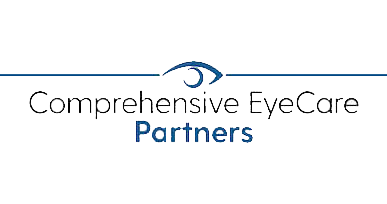Do you have dry, irritated, or gritty eyes? These are some of the common symptoms of a chronic condition called dry eye syndrome.
You may not realize that if you have dry eyes, drinking more water and staying hydrated can make a big difference as part of a dry eye treatment plan. Drinking more water helps your eyes maintain a healthy tear volume, which is an essential part of keeping dry eyes and their symptoms at bay. Keep reading to learn more about dry eyes and how hydration can help!
Dry Eye Syndrome
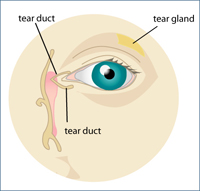
Your tears prevent the eye surface from drying out, ensuring eye health and comfort. Dry eye is caused when you don’t produce enough tears or the tears you’re producing are low in quality.
Aside from the discomfort that comes with dry eye, other symptoms include:
- Blurred vision
- Watery eyes
- A stinging feeling in your eyes
- Increased sensitivity to light
- The sensation of a foreign object in your eyes
- Eye redness
- Pain in the eyes
- Stringy mucus
- Eye fatigue
You may experience one or two of these symptoms, or you may find that you experience all of them. It differs from person to person and depends on the severity of your dry eyes.
How Drinking Water Helps with Dry Eye Syndrome
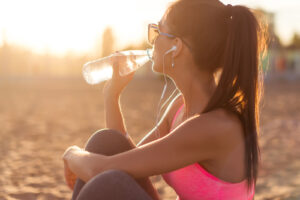
Many people don’t notice that staying hydrated by drinking water throughout the day is good for their eyes. But they do experience the side effects of dehydration because they don’t drink enough water.
You’re more likely to lose water if you drink a lot of caffeine, alcohol, or soft drinks. You’ll also become more dehydrated if you have a high salt intake or if you don’t drink enough water when you’re sweating and working out.
Your eyes need water, which is in the form of tears, to remain lubricated. Lubrication gets rid of bacteria, dust, and other tiny particles that enter your eyes.
It also keeps your eyes moist. When your body is dehydrated, your eyes become dry and uncomfortable. Your tears are an essential method of delivering nutrients to your eyes.
Other signs of dehydration are:
- Blurred vision
- Itchy, red eyes
- Trouble focusing
- Headaches
- Increased eye strain
The best way to avoid dehydration if you have dry eyes is to drink water regularly. Start by drinking at least the recommended 8 to 10 glasses of water daily.
If you consume a lot of sodium, consider switching to a low-sodium diet. You’ll also want to limit how many energy drinks, soft drinks, alcoholic beverages, and caffeinated beverages you drink.
Do your best to substitute these with water periodically throughout the day. If you like to work out, do your body a favor and increase your intake of fluids before and after exercising to replace the water lost through sweating.
Eating Hydrating Foods is Important for Dry Eyes
Almost one-fifth of the water in your body comes from the foods you eat, which are vegetables and fruits. Keep your water intake high by eating hydrating foods. Even if you don’t like drinking water, you can stay hydrated by adding foods with a higher water composition to your diet.
Celery

This lean, green vegetable comes packed with 95 percent water. Try snacking on it with peanut butter or on its own.
Watermelon

If you don’t like the taste of plain water, you can add watermelon to flavor your water. The fruit contains 92 percent water. You can also add it to salads, smoothies, or enjoy it as a refreshing snack.
Cucumber

Did you know that cucumbers have a water content of 95 percent? Whether you’re dipping them in ranch or munching on them alone, they are a fantastic way to add a little hydration to your day!
Zucchini

Make a healthy side dish that’s both good for you and your eyes with some zucchini since they are made up of 95 percent water!
What If My Eyes are Still Dry After Drinking Enough Water?

Sometimes, you can still get dehydrated regardless of how much water you drink or how many hydrating foods you include in your diet. It may not make sense considering dehydration is when more water leaves your body than what’s coming in.
Why is it so challenging to stay hydrated even when you’re drinking plenty of water and trying to eat enough hydrating foods? Although these are helpful when it comes to keeping your eyes from getting dry, they aren’t the only things that can lead to dry eyes.
Stress and spending too much time looking at digital screens also lead to symptoms of dry eye. On top of drinking lots of water and eating hydrating foods, it’s also crucial to find methods of easing your stress, like exercising regularly. Also, remember to take breaks if you’re spending time in front of a digital device, like your computer.
It’s important to note that if your dry eye worsens, the friction caused by a lack of moisture can eventually lead to corneal ulcers, a vision-threatening condition.
Dry Eye Treatment
If you’ve tried at-home methods, drinking more water, eating hydrating foods, reducing your screen time, and you still have dry eyes, it’s time to see your eye doctor. At Evergreen Eye Center, we offer our dry eye patients the following leading-edge methods:
BlephEx®
For patients with blepharitis, a treatment called BlephEx can be incredibly successful. Blepharitis is a condition that’s common in people that have dry eye syndrome.
BlephEx allows your eye doctor to clean the eyelids and eyelashes safely. When patients have blepharitis, the eyes build up skin cells and debris, creating a biofilm on the eyelids. This biofilm causes chronic irritation and can affect tear production.
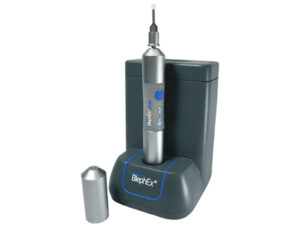
If this film isn’t removed, it’ll continue to grow until it blocks the meibomian glands. The meibomian glands are responsible for producing meibum, an oil that prevents your tears from evaporating too fast.
When these glands become obstructed, there’s nothing to stop tears from evaporating from your eyes. This is known as meibomian gland dysfunction (MGD) and is a leading cause of dry eye.
BlephEx® removes all debris on your eyelids, clearing the biofilm in the process. The treatment uses a spinning micro-sponge that gently and safely exfoliates your lashes and eyelid, significantly improving dry eye symptoms.
iLux®
iLux® is a treatment designed to treat evaporative dry eye, a condition that occurs when your tears don’t have enough oil. Evaporative dry eye is mainly due to meibomian gland dysfunction.
Meibomian gland dysfunction is a chronic condition that worsens over time if not treated. Some of the symptoms of MGD include a burning sensation, irritation, and a gritty feeling in the eyes.
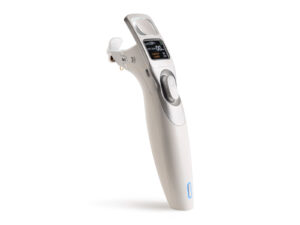
iLux® is a proven treatment for MGD that applies heat and gentle pressure on your eyelids. This action unblocks the meibomian glands, enabling them to release healthy oil that protects your tears from evaporating too quickly. iLux® addresses the root cause of dry eye—MGD, considerably alleviating the symptoms of dry eye.
Find Relief from Dry Eye
The ophthalmologists at Evergreen Eye Center take dry eye very seriously. We use leading-edge technology to diagnose your dry eye correctly and provide you with the most effective treatment.
Our dry eye treatment plans are tailored to your unique needs to achieve outstanding results.
Ready to find the relief you need from dry eye syndrome? Schedule an appointment at Evergreen Eye Center in Seattle, WA, now!

